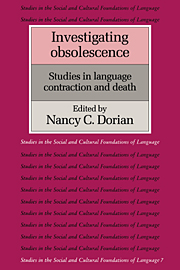Book contents
- Frontmatter
- Contents
- List of maps
- List of contributors
- Preface
- Map
- Dedication
- Introduction
- I Focus on context
- II Focus on structure
- 11 Problems in obsolescence research: The Gros Ventres of Montana
- 12 The structural consequences of language death
- 13 On signs of health and death
- 14 Case usage among the Pennsylvania German sectarians and nonsectarians
- 15 Estonian among immigrants in Sweden
- 16 The incipient obsolescence of polysynthesis: Cayuga in Ontario and Oklahoma
- 17 Urban and non-urban Egyptian Nubian: Is there a reduction in language skill?
- 18 Some lexical and morphological changes in Warlpiri
- 19 Language contraction and linguistic change: The case of Welland French
- 20 Lexical innovation and loss: The use and value of restricted Hungarian
- III Invited commentaries
- Bibliography
- Index of languages
- General index
17 - Urban and non-urban Egyptian Nubian: Is there a reduction in language skill?
Published online by Cambridge University Press: 08 January 2010
- Frontmatter
- Contents
- List of maps
- List of contributors
- Preface
- Map
- Dedication
- Introduction
- I Focus on context
- II Focus on structure
- 11 Problems in obsolescence research: The Gros Ventres of Montana
- 12 The structural consequences of language death
- 13 On signs of health and death
- 14 Case usage among the Pennsylvania German sectarians and nonsectarians
- 15 Estonian among immigrants in Sweden
- 16 The incipient obsolescence of polysynthesis: Cayuga in Ontario and Oklahoma
- 17 Urban and non-urban Egyptian Nubian: Is there a reduction in language skill?
- 18 Some lexical and morphological changes in Warlpiri
- 19 Language contraction and linguistic change: The case of Welland French
- 20 Lexical innovation and loss: The use and value of restricted Hungarian
- III Invited commentaries
- Bibliography
- Index of languages
- General index
Summary
In Old Nubia, that is, before the 1964 resettlement (see Chapter 6), the Nubian language was resistant to Arabic interference because it was an undisputed language in a remote place. Women and children were mostly monolingual Nubian speakers. Men in general spoke both Nubian and Arabic due to the fact that they had to travel to cities such as Cairo and Alexandria looking for wage labor. However, there is a noticeable difference in the trend of migration after the resettlement of 1964. Labor migration to big cities is not as high as it was prior to resettlement, due to the availability of job opportunities in New Nubia.
Nubians can be found as well-entrenched and well-assimilated urbanized groups in cities, and on the other hand as non-urbanized groups living in Southern Egypt in small villages. Groups in several types of locations were chosen for this study. The first group was drawn from isolated villages, where Nubian inhabitants must take a bus to go to the nearest city. The second group was drawn from villages near Aswan, where Nubians can walk or cross the river by boat to that city. The third and final group was drawn from the cities of Aswan, Cairo, and Alexandria, where Nubian men work, but still maintain a home in their Nubian village in Southern Egypt. The different locations were chosen because they give a representative sample of urban, quasi-urban, and non-urban Nubian speakers.
In the new community created after the resettlement of 1964, the Egyptian Nubians came into closer contact with non-Nubian Egyptians. Nubian, an East Sudanic language, came into contact with a dominant Semitic language, Arabic.
- Type
- Chapter
- Information
- Investigating ObsolescenceStudies in Language Contraction and Death, pp. 259 - 266Publisher: Cambridge University PressPrint publication year: 1989
- 2
- Cited by

